Key takeaways:
- Border crossing challenges can stem from minor paperwork errors and varying country regulations, emphasizing the need for thorough preparation.
- Homeland security is vital for maintaining safety, and travelers should appreciate the measures in place to protect them.
- Staying informed about customs regulations and maintaining a positive attitude can alleviate stress during border crossings.
- Personal anecdotes highlight the importance of preparedness and human connection in transforming potentially stressful border experiences.
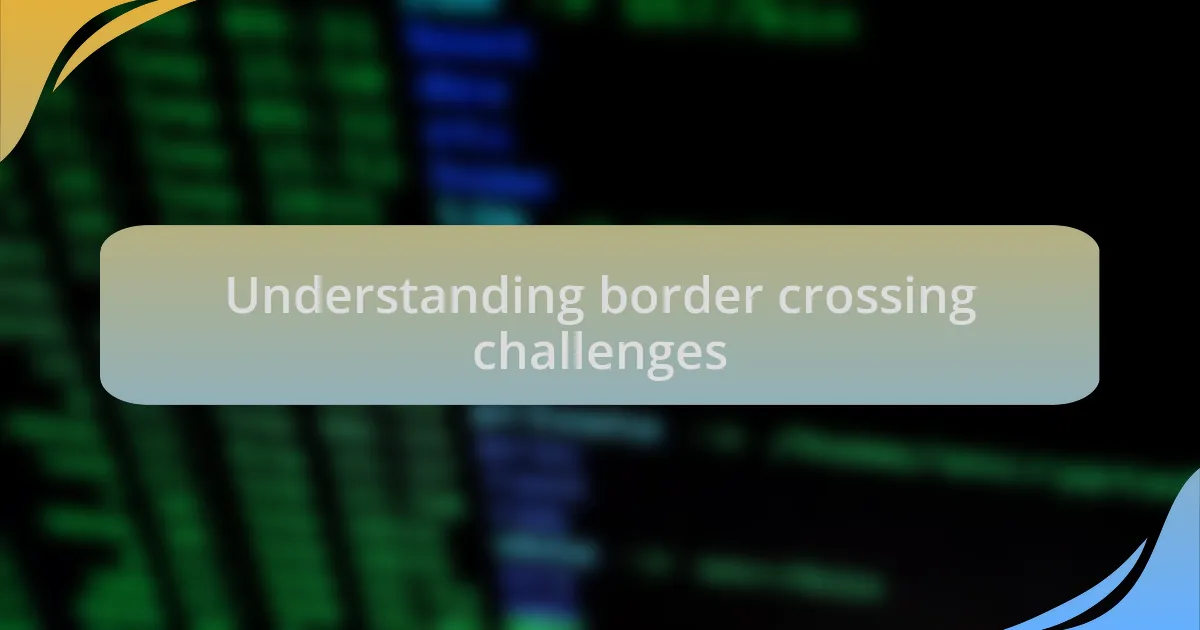
Understanding border crossing challenges
Navigating border crossing challenges can feel like an emotional rollercoaster. I vividly remember standing in a long line, my heart racing as I watched people ahead of me being questioned. It made me wonder, what really dictates how smoothly—or not—this process goes for each individual?
I once faced a situation where a simple paperwork error delayed me for hours. It was frustrating to think how a minor detail could create such a significant roadblock. Isn’t it interesting how our lives can hinge on these small, seemingly trivial issues?
Border crossing also brings its own set of fears and uncertainties. I often found myself questioning, what if I forgot a vital document or misstepped during an interrogation? The stress of those moments can be overwhelming, but they also taught me how crucial it is to be prepared and informed.
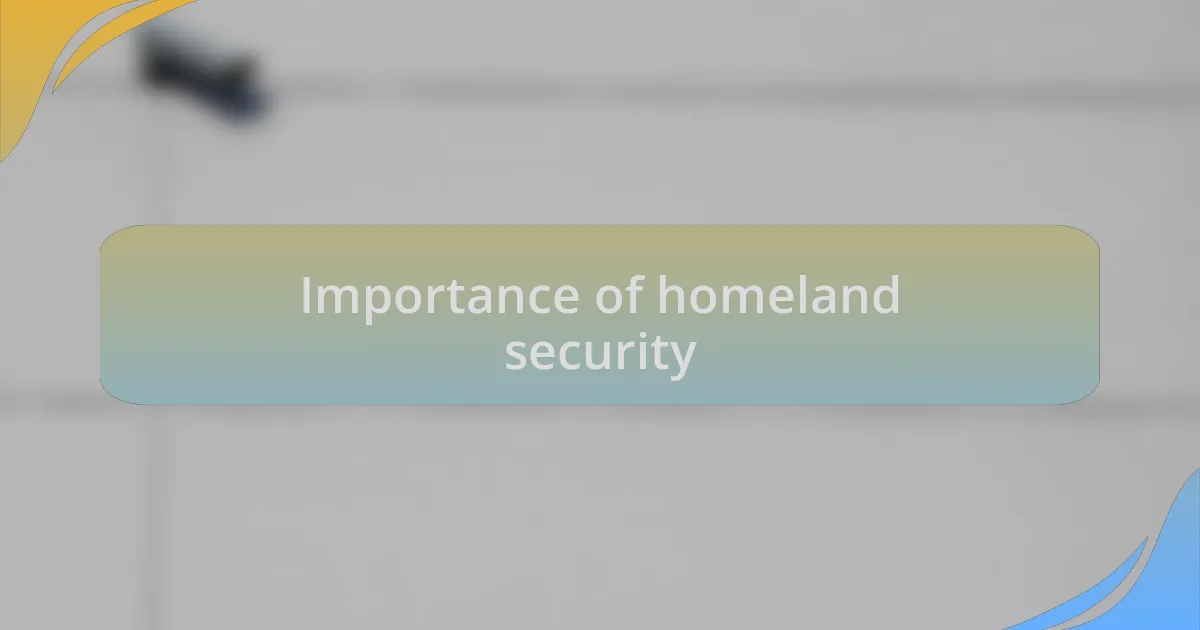
Importance of homeland security
Homeland security plays a pivotal role in maintaining the safety and stability of our nation. I recall a time when I was traveling and saw firsthand how customs officials operated. Their attention to detail gave me a sense of reassurance, knowing they were working tirelessly to identify potential threats. It’s essential to acknowledge that without these protective measures, our everyday lives could be at risk from various dangers.
The significance of homeland security extends beyond just preventing attacks; it also encompasses the protection of our borders. During one border crossing, I noticed guards diligently checking IDs and scanning luggage, which brought to mind the larger implications of their jobs. It made me question: how much do we take for granted the safety we enjoy when we travel? It’s a complex balance, and their vigilance is a key part of that equation.
Ultimately, a robust homeland security framework fosters trust within communities. I remember discussing security protocols with fellow travelers in the waiting area. We exchanged stories and opinions about how these measures, while sometimes inconvenient, serve a vital purpose. Doesn’t it feel comforting to know that measures are in place to safeguard not just our borders, but also the very fabric of our society?
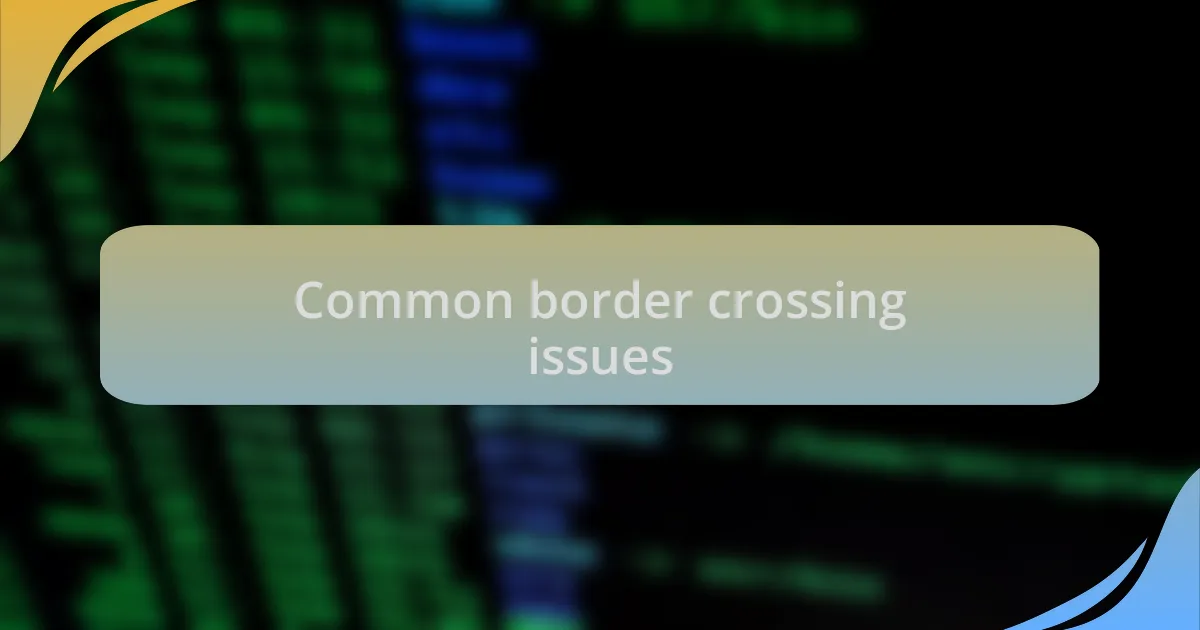
Common border crossing issues
Navigating border crossings often brings its own set of challenges that travelers frequently encounter. For instance, I once found myself in a long line, anxious about missing my flight, only to discover that a minor paperwork issue had triggered additional scrutiny. It made me ponder—what simple steps could travelers take to avoid unnecessary delays? Ensuring that all documents are in order beforehand could save a lot of frustration.
Another hurdle involves the varying regulations between countries, which can be confusing. I remember the moment I crossed into a new country and was faced with unexpected baggage restrictions. It left me feeling flustered and pondering how, if I had only done a little more research, I could have alleviated that stress. Having clear information pertaining to the specific rules can make a significant difference for anyone crossing borders.
Additionally, the emotional toll of uncertainty cannot be overlooked. I felt a wave of anxiety wash over me as I stood waiting for my turn at customs, wondering if something so minor could derail my plans. Have you ever felt that same nervousness? It’s a testament to how vital it is for border security to strike that balance between thoroughness and efficiency. Understanding and preparing for these common issues can significantly enhance one’s travel experience.
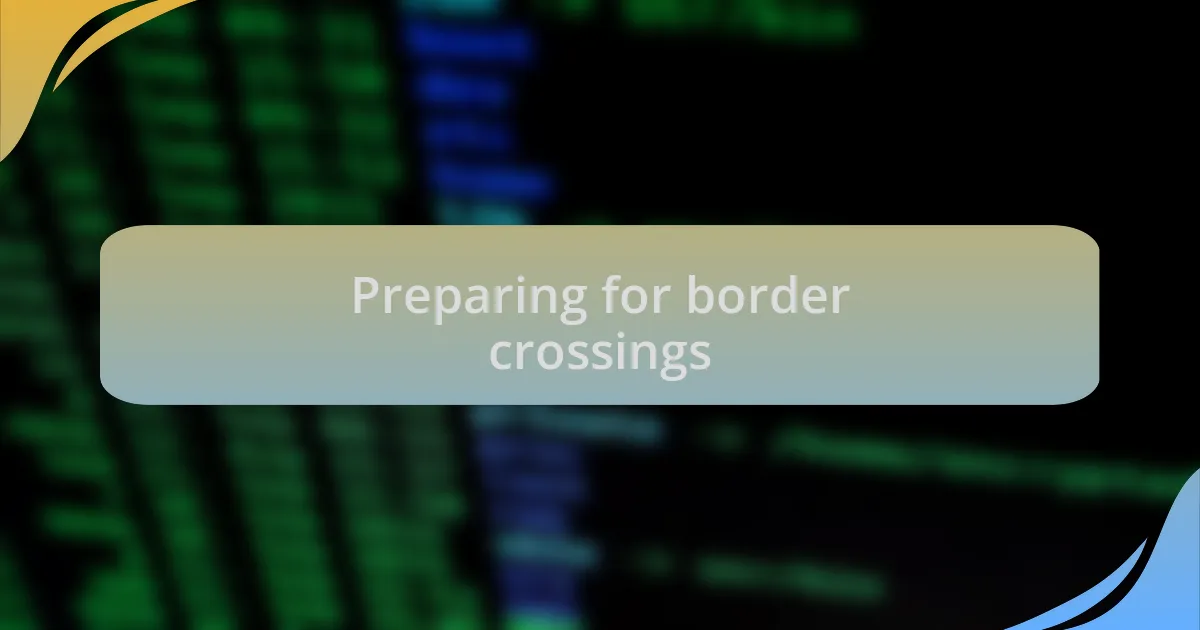
Preparing for border crossings
Preparing for border crossings involves a lot of planning and attention to detail. I recall meticulously checking my passport and ensuring that my visa was valid long before my trip. There’s a certain sense of peace that comes with knowing everything is in order—and believe me, that mental clarity can make a world of difference when embarking on a journey.
One particular experience stands out to me: I had forgotten to declare a souvenir, thinking it was just a harmless trinket. When I got pulled aside for questioning, my heart raced at the thought of facing potential fines or delays. Have you ever had that sinking feeling, realizing a simple mistake could have major consequences? I learned the hard way that understanding customs regulations beforehand is crucial for a smooth crossing.
I often remind myself that preparation goes beyond just documents. Reviewing personal items and ensuring compliance with regulations can provide a cushion against unexpected roadblocks. I remember watching fellow travelers become agitated at the border, and I couldn’t help but think that a little pre-travel research could have helped ease their minds too. How well do you know what you can and cannot bring across borders? It’s worth taking that extra time to find out.
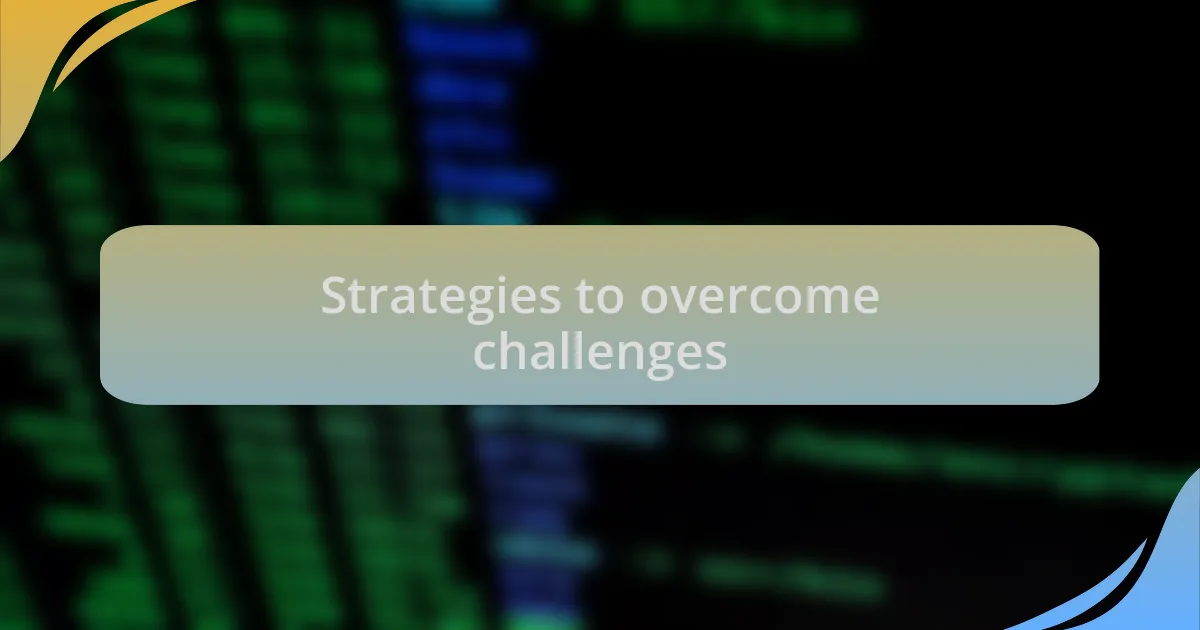
Strategies to overcome challenges
Navigating border crossing challenges requires a proactive mindset. One strategy I found particularly helpful was to assemble a checklist of necessary documents and regulations well in advance of travel. I still remember the anxiety of arriving at the border only to realize I had neglected to bring a required document. It made me think: how many travelers face unnecessary stress simply due to a lack of preparation?
Staying informed about current laws and restrictions can be incredibly advantageous. I once encountered a situation where the country I was visiting had suddenly tightened its customs policies. By checking reputable travel advisory sites regularly, I was able to adjust my packing and avoid potential hassles. It raises an important question: why risk your trip by leaving information to chance?
Finally, I found that fostering a positive attitude can make a world of difference. During a particularly stressful crossing, I took a deep breath and reminded myself that most border officials are just doing their jobs. Instead of approaching the encounter with dread, I chose to see it as an opportunity for connection. Has anyone ever felt the difference a positive attitude can make in high-pressure situations? I believe that embracing that mindset not only eased my anxiety but also shifted the interaction into a more pleasant exchange.
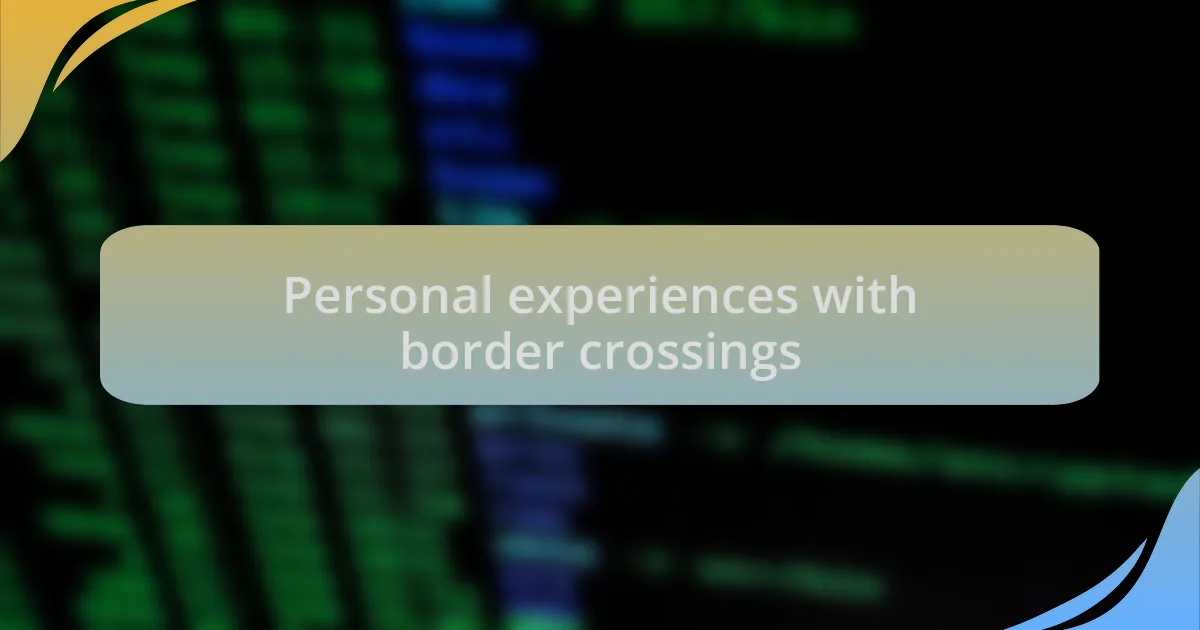
Personal experiences with border crossings
There was a time when I reached the border, feeling confident until I discovered my passport had expired. I still vividly recall the sinking feeling in my stomach as I frantically searched for a solution. It was a harsh reminder: sometimes, even a small oversight can lead to significant setbacks. Have you ever faced a sudden challenge that threw your plans into disarray?
On another occasion, I approached a border crossing during peak travel season. The line stretched for what felt like miles, and impatience hung heavy in the air. I took a moment to observe fellow travelers, many of whom were visibly frustrated. I opted instead to strike up a casual conversation with the person in front of me. Suddenly, what could have been an ordeal became an unexpected social experience. Isn’t it fascinating how weaving in a little human connection can transform a stressful moment?
Lastly, I vividly remember a crossing where I had to declare a few personal items. I felt nervous as I approached the customs officer, worried about how my honesty might be interpreted. When I finally spoke up, I saw a human being instead of just authority. The officer smiled and waved me through with a simple “Thank you for being honest.” It made me ponder: how often do we underestimate the power of sincerity in potentially daunting situations?